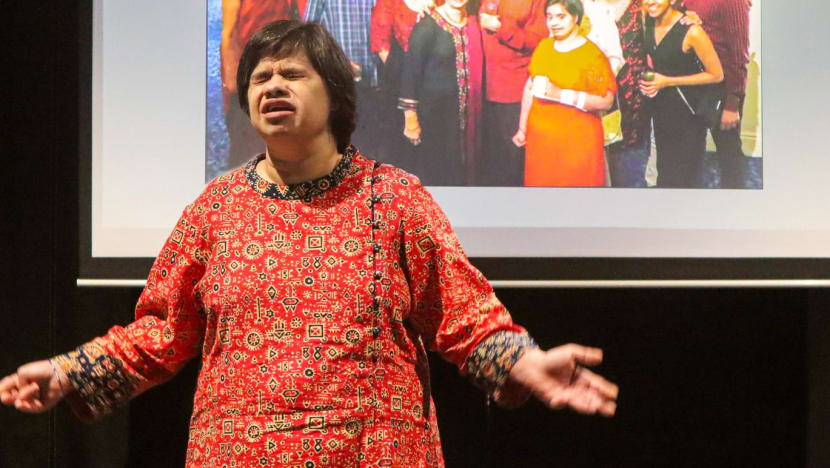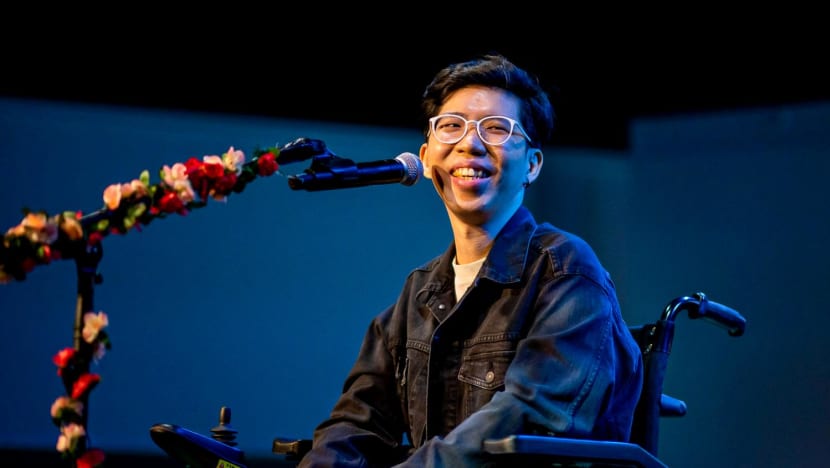Veterans in arts industry take people with disabilities under their wing
The industry mentorship programme by non-profit organisation ART:DIS offers participants guidance in performing arts and visual arts.

Ms Jaspreet Kaur, who has Down Syndome, put up a one-woman show after a mentorship programme under non-profit organisation ART:DIS. (Photo: ART:DIS)
SINGAPORE: Ms Jaspreet Kaur has never had trouble finding her rhythm.
It is finding her voice that has been a little harder for the budding actor who has Down Syndrome.
But after being mentored by playwright Haresh Sharma, Ms Kaur put up her own one-woman show in 2022 at the age of 42.
"Now I feel more confident. He can break down the steps so that they're explained more easily,” she told CNA.
Ms Kaur is a participant of the industry mentorship programme by non-profit organisation ART:DIS.
Under the programme, veterans take artists with disabilities under their wing to better prepare them for a career in the arts. The programme offers participants guidance in performing arts and visual arts and is open to artists with any kind of disability, whether intellectual, or physical.
They get to spend a year working with veterans in their chosen field.
GETTING ON STAGE ON A WHEELCHAIR
Aspiring musician Shen Yu Xiang, for instance, wants to be a full-time musician and found the guidance he needed.
Mr Shen, who goes by the stage name Sky, was diagnosed with muscular dystrophy at the age of five and has been using a wheelchair since the age of 12.
“When I was trying to do music alone, I really struggled to find platforms or resources that could help me put my ideas into action. But this mentorship gave me specific guidance and knowledge on what I need to learn,” he said.
Another area he struggled in was finding opportunities, as people were not always open to the idea of accommodating a wheelchair singer.

“When I did find some opportunities to perform at some cafes or pubs, the stage area was not wheelchair accessible. So, I was sometimes beside the stage, behind the stage, in front of the stage, but never on stage,” he said.
Through the programme, he found alternative ways, for example, live streaming, to get his music across to an audience.
His partnership with his mentor, composer Philip Tan has gone beyond the programme that ended in 2022.
"Until now, Sky is still sending me the music that he enjoys. And he's asking me to make comments about the music that he composes as well,” said Dr Tan.
LACK OF FUNDING, OTHER CHALLENGES
Still, limited resources and the difficulty of managing a spectrum of disabilities at the same time means the organisation has to keep classes small.
Only nine artists could take part in the programme's latest run.
Nonetheless, ART:DIS said it is important to start somewhere, as these artists need opportunities beyond just community projects.
"We wanted to raise the bar for artists with disabilities so that they could professionalise, that they could enter and meet industry standards with the right opportunities, with the right infrastructure support,” said the organisation’s executive director Angela Tan.
Even after the programme, finding a job is not easy, those who spoke to CNA said.
There is a need for more support, said autistic artist and researcher Dr Dawn-Joy Leong. While people with disabilities are now given a lot more access as an audience, the same shift has not happened for artists, she said.
“I find that disabled artists are still not well-supported. And it's a bit of a difficult cycle to break but I think we really need to bring that together,” she said.
There are currently no disability-specific grants under the National Arts Council, though it said access costs can be included in project budgets. It also hosted a forum to better understand the needs of artists with disabilities.
“NAC will continue to work with relevant partners within the social and disability sectors, to build a connected society that advocates for greater inclusion in the arts, for people across all abilities,” it said.


















